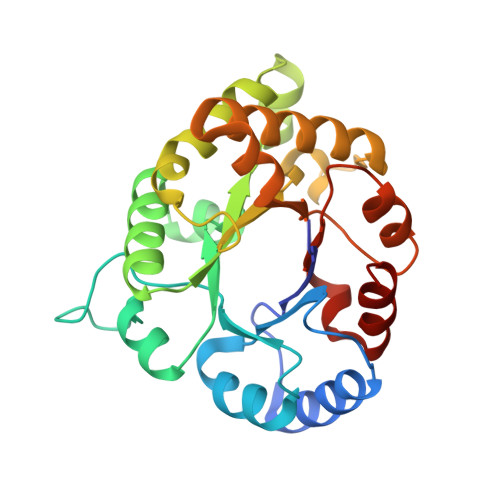Probing the role of the fully conserved Cys126 in triosephosphate isomerase by site-specific mutagenesis--distal effects on dimer stability.
Samanta, M., Banerjee, M., Murthy, M.R., Balaram, H., Balaram, P.(2011) FEBS J 278: 1932-1943
- PubMed: 21447068
- DOI: https://doi.org/10.1111/j.1742-4658.2011.08110.x
- Primary Citation of Related Structures:
3PVF, 3PWA, 3PY2 - PubMed Abstract:
Cys126 is a completely conserved residue in triosephosphate isomerase that is proximal to the active site but has been ascribed no specific role in catalysis. A previous study of the C126S and C126A mutants of yeast TIM reported substantial catalytic activity for the mutant enzymes, leading to the suggestion that this residue is implicated in folding and stability [Gonzalez-Mondragon E et al. (2004) Biochemistry 43, 3255-3263]. We re-examined the role of Cys126 with the Plasmodium falciparum enzyme as a model. Five mutants, C126S, C126A, C126V, C126M, and C126T, were characterized. Crystal structures of the 3-phosphoglycolate-bound C126S mutant and the unliganded forms of the C126S and C126A mutants were determined at a resolution of 1.7-2.1 Å. Kinetic studies revealed an approximately five-fold drop in k(cat) for the C126S and C126A mutants, whereas an approximately 10-fold drop was observed for the other three mutants. At ambient temperature, the wild-type enzyme and all five mutants showed no concentration dependence of activity. At higher temperatures (> 40 °C), the mutants showed a significant concentration dependence, with a dramatic loss in activity below 15 μM. The mutants also had diminished thermal stability at low concentration, as monitored by far-UV CD. These results suggest that Cys126 contributes to the stability of the dimer interface through a network of interactions involving His95, Glu97, and Arg98, which form direct contacts across the dimer interface.
Organizational Affiliation:
Molecular Biophysics Unit, Indian Institute of Science, Bangalore, India.

















